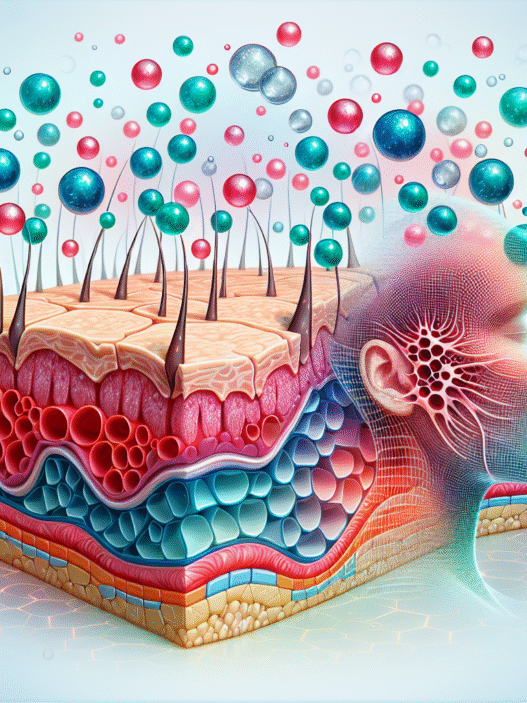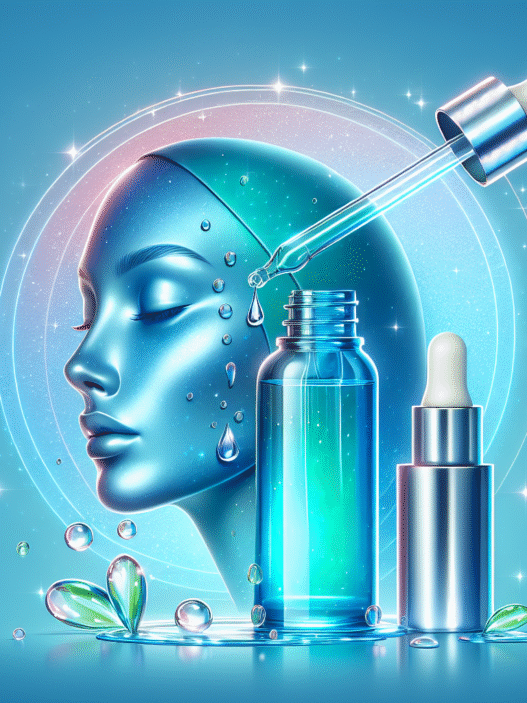Understanding Hyaluronic Acid
Hyaluronic acid (HA) is a naturally occurring substance in the body, predominantly found in connective tissues, skin, and cartilage. It plays a crucial role in maintaining skin health and promoting hydration.
Role in Skin Health
Hyaluronic acid serves as a vital component in skin repair and rejuvenation. According to research, it is instrumental in wound healing, creating a porous scaffolding network that facilitates cell migration and proliferation necessary for effective skin recovery (PubMed Central). As a humectant, HA can bind up to 1,000 times its weight in water, allowing it to retain moisture and thereby enhance skin hydration levels (Healthline).
The efficacy of topical HA has been highlighted in various studies. A 2022 review concluded that topical hyaluronic acid is not only effective but also well-tolerated post-facial or surgical rejuvenation procedures, leading to improved skin hydration and suppleness (Medical News Today).
Importance of Hydration
Hydrated skin is essential for maintaining elasticity, suppleness, and overall skin health. Hyaluronic acid helps slow the rate of water evaporation from the skin, minimizing transepidermal water loss. This function is crucial for individuals, especially those with dry or aging skin, as dehydrated skin can lead to wrinkles and fine lines.
The molecular weight of hyaluronic acid also plays a significant role in its effectiveness. HA with a molecular weight between 50 to 1,000 kDa, particularly at 130 kDa, has been found to improve skin elasticity by up to 20% after just one month.
Maintaining optimal hydration through products like hyaluronic acid serum or hyaluronic acid moisturizer can support skin health and contribute toward a youthful appearance. For those interested in understanding all the protective benefits this compound offers, exploring hyaluronic acid benefits can provide valuable insights.
Benefits of Hyaluronic Acid
Hyaluronic acid is a significant player in the beauty and skincare world. Its numerous benefits make it a sought-after ingredient for individuals seeking to enhance their skin health and appearance. This section delves into the specifics of how hyaluronic acid contributes to skin rejuvenation and its notable anti-aging properties.
Skin Rejuvenation
One of the primary benefits of hyaluronic acid is its ability to improve skin hydration, suppleness, and overall rejuvenation. Research indicates that topical applications of hyaluronic acid can lead to noticeable improvements in skin hydration and a reduction in signs of photoaging (Medical News Today). By attracting moisture from the environment and binding it within skin cells, hyaluronic acid ensures that the skin remains plump and hydrated.
Additionally, studies show that this compound is effective in supporting skin recovery after facial or postsurgical procedures. Enhanced hydration contributes not only to a fresher appearance but also improves the skin’s overall texture.
The following table summarizes the key effects of hyaluronic acid on skin rejuvenation:
| Benefit | Description |
|---|---|
| Improves Hydration | Attracts and retains moisture in the skin |
| Enhances Suppleness | Increases skin elasticity and flexibility |
| Reduces Photoaging | Minimizes visible signs of aging and dryness |
For those looking to incorporate hyaluronic acid into their routine, options like hyaluronic acid serum or hyaluronic acid moisturizer can be beneficial.
Anti-Aging Properties
Hyaluronic acid is also recognized for its urgent role in anti-aging skincare. Its unique ability to retain moisture contributes to a more youthful appearance. Oral forms of hyaluronic acid have been found effective in enhancing skin hydration, improving skin tone, and increasing epidermal thickness, further demonstrating its anti-aging capabilities.
Moreover, this compound supports overall skin health by enhancing flexibility and elasticity over time (Cleveland Clinic). As the skin ages, it naturally loses moisture and plumpness, but regular application of hyaluronic acid can help mitigate these effects.
The following table illustrates the anti-aging effects associated with hyaluronic acid:
| Anti-Aging Benefit | Description |
|---|---|
| Increases Hydration | Keeps skin plump and youthful |
| Enhances Texture | Smoothens skin surface and reduces roughness |
| Improves Elasticity | Maintains skin’s firmness and suppleness |
To discover more about how hyaluronic acid can fit into your beauty routine, explore hyaluronic acid injections or hyaluronic acid supplements. With its multifaceted benefits, hyaluronic acid is indeed a game changer for anyone interested in enhancing their skin health through effective hydration, rejuvenation, and anti-aging solutions.
Different Forms of Hyaluronic Acid
Hyaluronic acid is a versatile ingredient widely used in skincare formulations. Understanding the different types and molecular weights of hyaluronic acid can help beauty enthusiasts choose the right products for their skincare needs.
Types and Functions
Several forms of hyaluronic acid are present in skincare products, each serving distinct functions:
| Type of Hyaluronic Acid | Function |
|---|---|
| High Molecular Weight Hyaluronic Acid | Forms a protective barrier on the skin, providing moisture retention and improving skin texture. |
| Low Molecular Weight Hyaluronic Acid (Sodium Hyaluronate) | Penetrates deeper into the skin, stimulating cell proliferation and enhancing collagen production (hyaluronic acid benefits). |
| Hydrolyzed Hyaluronic Acid | Smaller-sized molecules that offer hydration and improved absorption, often included in serums. |
| Cross-Linked Hyaluronic Acid (Sodium Hyaluronate Crosspolymer) | Provides long-lasting hydration by forming a gel-like substance that holds moisture in the skin. |
| Acetylated Hyaluronic Acid (Sodium Acetylated Hyaluronate) | Combines hydrophilic and lipophilic properties, offering enhanced moisture retention and reducing wrinkles (hyaluronic acid and wrinkles). |
Acetylated hyaluronic acid is noteworthy for absorbing three times more water than ordinary hyaluronic acid, as well as inhibiting the release of MMP-1, which degrades collagen.
Molecular Weights and Effects
Molecular weight is a key factor in determining the efficacy of hyaluronic acid in skincare:
| Molecular Weight Category | Weight (kDa) | Effects |
|---|---|---|
| High Molecular Weight | > 500 | Creates a protective layer on the skin, preventing moisture loss but with limited penetration. |
| Low Molecular Weight | < 500 | Enhances skin penetration, stimulates cell proliferation, and aids in collagen synthesis. |
A recent study indicated that smaller hyaluronic acid substances (under 500 kDa) demonstrated better skin penetration ability compared to larger molecules, which struggled to pass through the skin barrier. Low molecular weight hyaluronic acid’s ability to integrate with other beneficial ingredients, such as aloe vera and provitamin B5, also contributes to its popularity in products like hyaluronic acid serum.
Understanding these different forms and their molecular weights allows individuals to select products that best cater to their skin type and concerns, whether for hydration, anti-aging effects, or overall skin repair through hyaluronic acid and skin repair.
Applications of Hyaluronic Acid
Hyaluronic Acid (HA) has gained popularity in the beauty and healthcare industries due to its versatile applications. From topical treatments to oral supplements, HA offers various benefits for skin health and overall well-being.
Topical Treatments
Topical applications of hyaluronic acid are widely recognized for their efficacy in promoting skin hydration and repair. A 2022 review indicates that HA is effective as a treatment after facial or postsurgical rejuvenation procedures, enhancing skin hydration and suppleness (Medical News Today). It is also known for aiding in wound healing by regulating inflammation, which is beneficial for minor wounds, burns, or more severe injuries like surgical scars.
| Benefits of Topical Hyaluronic Acid | Description |
|---|---|
| Skin Hydration | Increases moisture levels in the skin. |
| Improved Suppleness | Enhances skin elasticity and plumpness. |
| Wound Healing | Aids in the repair of minor wounds and promotes overall skin health. |
For more information on specific products, consider exploring options like hyaluronic acid serums, hyaluronic acid creams, and hyaluronic acid moisturizers.
Oral Supplements
In addition to topical treatments, hyaluronic acid is available in oral supplement form, which is thought to provide additional systemic benefits. These supplements are often promoted for joint health and skin rejuvenation.
Research indicates that when taken orally, hyaluronic acid can contribute to skin hydration and may also help reduce the appearance of wrinkles and signs of aging. These benefits can potentially lead to improved skin elasticity and a more youthful appearance.
| Benefits of Oral Hyaluronic Acid | Description |
|---|---|
| Joint Health | Provides lubrication in the joints, alleviating pain associated with conditions like osteoarthritis. |
| Skin Rejuvenation | Enhances skin moisture and reduces signs of aging. |
For those exploring options to improve skin health from within, hyaluronic acid supplements are worth considering. Overall, the multifaceted applications of hyaluronic acid demonstrate its critical role in skin repair and overall beauty enhancement, significantly contributing to the understanding of its benefits in the beauty and health sectors.
Hyaluronic Acid in Skincare Products
Hyaluronic acid has gained popularity as a key ingredient in various skincare products. Its unique properties make it beneficial for enhancing skin hydration and overall health. This section explores the application of hyaluronic acid in serums, creams, and other beauty products designed for nail and lip care.
Serums and Creams
Hyaluronic acid serums are among the most sought-after products in skincare routines. These serums are designed to penetrate deeply into the skin, delivering intense hydration and improving the skin’s elasticity and flexibility (Cleveland Clinic). The ability of hyaluronic acid to bind up to 1000 times its weight in water makes it an effective humectant, ensuring that the skin remains plump and hydrated throughout the day (Healthline).
| Product Type | Benefits |
|---|---|
| Hyaluronic Acid Serum | Deep hydration, improved skin elasticity, reduced appearance of wrinkles. |
| Hyaluronic Acid Cream | Enhanced moisture retention, reduction of transepidermal water loss, softer skin texture. |
Over-the-counter hyaluronic acid serums and creams are considered safe for daily use. Long-term application can enhance overall skin health and contribute to a more youthful appearance. For those looking for specific benefits, different forms of hyaluronic acid are available in various products, each designed to cater to particular skin needs, such as moisturizing and anti-aging effects.
Nail and Lip Care
Hyaluronic acid is not limited to facial skincare; it also plays a vital role in nail and lip care products. For the lips, hyaluronic acid helps retain moisture, providing a plump and hydrated appearance. Lip balms and treatments containing hyaluronic acid are ideal for individuals seeking to combat dryness and enhance lip fullness. Similarly, nail care products infused with hyaluronic acid can help maintain healthy, hydrated nails, reducing brittleness and breakage.
| Product Type | Benefits |
|---|---|
| Hyaluronic Acid Lip Balms/Treatments | Reduces dryness, enhances lip volume, improves overall lip health. |
| Hyaluronic Acid Nail Care Products | Hydrates nails, reduces brittleness, promotes nail strength. |
Both nail and lip products featuring hyaluronic acid are increasingly popular, capturing the interests of beauty enthusiasts looking to improve overall skin health. Through regular use of hydrating products containing hyaluronic acid, individuals can achieve a smoother and more youthful appearance across their skincare routine. For more insights into the benefits of hyaluronic acid, explore our article on hyaluronic acid benefits.
Research and Studies on Hyaluronic Acid
The exploration of hyaluronic acid and skin repair has garnered significant attention in the beauty industry and scientific community alike. This compound plays a crucial role in enhancing skin health, particularly in relation to wound healing and skin rejuvenation.
Efficacy in Skin Repair
Numerous studies have highlighted the efficacy of hyaluronic acid (HA) in skin repair, particularly in wound healing. HA acts as a scaffold structure for tissues, allowing for better regeneration and repair processes. It promotes the migration of fibroblasts, crucial for collagen production, and supports angiogenesis, which is the formation of new blood vessels necessary for healing Cleveland Clinic.
During the inflammatory phase of wound healing, HA synthesis peaks, modulating the inflammatory response by influencing neutrophil migration and plasmin production. This modulation is critical for a successful healing process, allowing the body to respond effectively to skin injuries PubMed Central.
| Role of Hyaluronic Acid in Wound Healing | Effect |
|---|---|
| Fibroblast Migration | Promotes tissue growth and repair |
| Collagen Production | Enhances skin firmness and elasticity |
| Angiogenesis | Supports new blood vessel formation |
| Inflammatory Response Modulation | Improves healing efficiency |
Research has indicated that HA-based dressings can significantly advance wound healing by reducing pain and enhancing antioxidant activity, leading to faster recovery times PubMed Central.
Clinical Findings
Clinical findings reinforce the benefits of hyaluronic acid in skincare. Studies demonstrate that the application of HA in various forms, including topical treatments and injections, can lead to noticeable improvements in skin hydration, elasticity, and overall appearance. Patients using hyaluronic acid-based products have reported enhanced skin texture and reduced signs of aging PubMed Central.
Furthermore, research supports the use of HA in anti-aging treatments, as it helps plump the skin and reduce the visibility of fine lines and wrinkles. The compound’s ability to attract and retain moisture makes it a key ingredient in many anti-aging formulations, reinforcing its position as a vital component of modern skincare routines.
In conclusion, the body of research surrounding hyaluronic acid affirms its importance not only in skin repair but also as a foundation for effective beauty treatments. For those interested in harnessing the benefits of this potent ingredient, exploring options such as a hyaluronic acid serum or hyaluronic acid moisturizer is recommended.





















